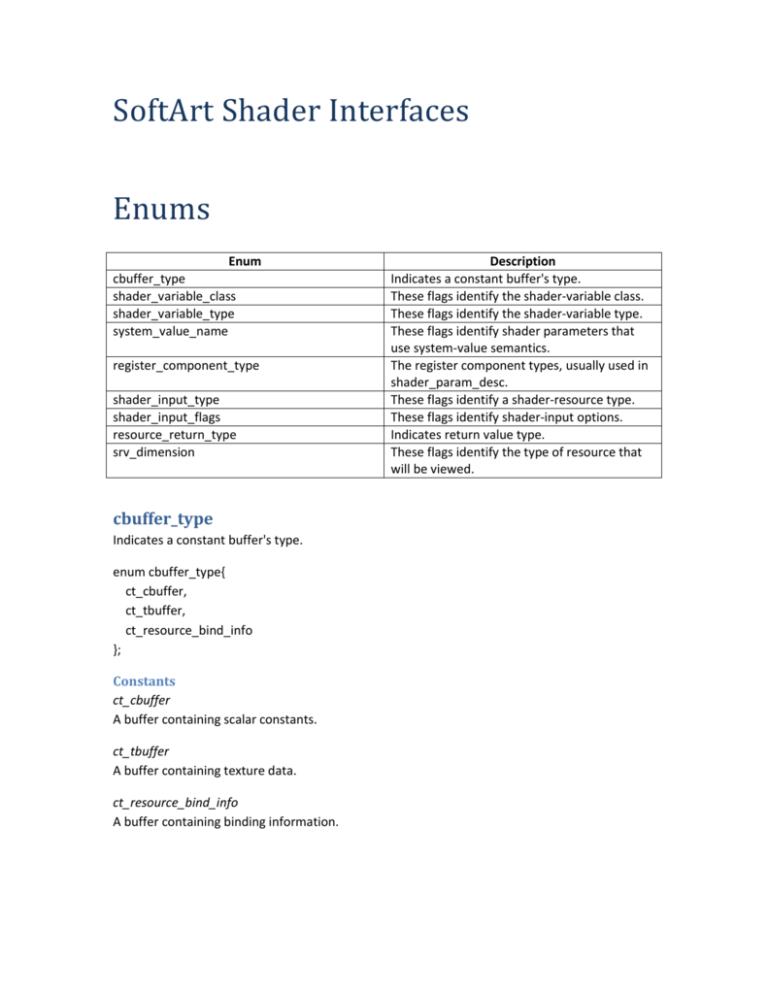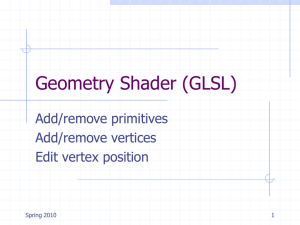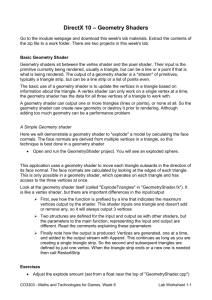These flags identify the shader
advertisement

SoftArt Shader Interfaces
Enums
Enum
cbuffer_type
shader_variable_class
shader_variable_type
system_value_name
register_component_type
shader_input_type
shader_input_flags
resource_return_type
srv_dimension
cbuffer_type
Indicates a constant buffer's type.
enum cbuffer_type{
ct_cbuffer,
ct_tbuffer,
ct_resource_bind_info
};
Constants
ct_cbuffer
A buffer containing scalar constants.
ct_tbuffer
A buffer containing texture data.
ct_resource_bind_info
A buffer containing binding information.
Description
Indicates a constant buffer's type.
These flags identify the shader-variable class.
These flags identify the shader-variable type.
These flags identify shader parameters that
use system-value semantics.
The register component types, usually used in
shader_param_desc.
These flags identify a shader-resource type.
These flags identify shader-input options.
Indicates return value type.
These flags identify the type of resource that
will be viewed.
shader_variable_class
These flags identify the shader-variable class.
enum shader_variable_class{
svc_scalar,
svc_vector,
svc_matrix_rows,
svc_matrix_columns,
svc_object,
svc_struct
};
Constants
svc_scalar
The shader variable is a scalar.
svc_vector
The shader variable is a vector.
svc_matrix_rows
The shader variable is a row-major matrix.
svc_matrix_columns
The shader variable is a column-major matrix.
svc_object
The shader variable is an object.
svc_struct
The shader variable is a structure.
Remarks
These flags describe the class of a shader variable. This is not a programming class; the class
identifies whether the variable class such as scalar, vector, object, etc. The shader-variable class
is used in a shader-input-signature description (see shader_input_bind_desc).
shader_variable_type
These flags identify the shader-variable type.
enum shader_variable_type{
svt_void,
svt_bool,
svt_int,
svt_float,
svt_string,
svt_texture,
svt_texture_1d,
svt_texture_2d,
svt_texture_3d,
svt_texture_cube,
svt_sampler,
svt_vertex_shader,
svt_pixel_shader,
svt_blend_shader,
svt_uint,
svt_uint8,
svt_geometry_shader,
svt_rasterizer,
svt_depth_stencil,
svt_blend,
svt_buffer,
svt_cbuffer,
svt_tbuffer,
svt_texture_1d_array,
svt_texture_2d_array,
svt_render_target_view,
svt_depth_stencil_view,
svt_texture_2d_ms,
svt_texture_2d_ms_array,
svt_texture_cube_array,
svt_double,
};
Constants
svt_void
The variable is a void pointer.
svt_bool
The variable is a boolean.
svt_int
The variable is a integer.
svt_float
The variable is a floating-point number.
svt_string
The variable is a string.
svt_texture
The variable is a texture.
svt_texture_1d
The variable is a 1D texture.
svt_texture_2d
The variable is a 2D texture.
svt_texture_3d
The variable is a 3D texture.
svt_texture_cube
The variable is a texture cube.
svt_sampler
The variable is a sampler.
svt_vertex_shader
The variable is a vertex shader.
svt_pixel_shader
The variable is a pixel shader.
svt_blend_shader
The variable is a blend shader.
svt_uint
The variable is an unsigned integer.
svt_uint8
The variable is an 8-bit unsigned integer.
svt_geometry_shader
The variable is a geometry shader.
svt_rasterizer
The variable is a rasterizer-state object.
svt_depth_stencil
The variable is a depth-stencil-state object.
svt_blend
The variable is a blend-state object.
svt_buffer
The variable is a buffer.
svt_cbuffer
The variable is a constant buffer.
svt_tbuffer
The variable is a texture buffer.
svt_texture_1d_array
The variable is a 1D-texture array.
svt_texture_2d_array
The variable is a 2D-texture array.
svt_render_target_view
The variable is a render-target view.
svt_depth_stencil_view
The variable is a depth-stencil view.
svt_texture_2d_ms
The variable is a 2D-multisampled texture.
svt_texture_2d_ms_array
The variable is a 2D-multisampled-texture array.
svt_texture_cube_array
The variable is a texture-cube array.
svt_double
The variable is a double.
Remarks
These flags are used by a shader-type description (see shader_type_desc).
system_value_name
These flags identify shader parameters that use system-value semantics.
enum system_value_name {
svn_undefined,
svn_position,
svn_clip_distance,
svn_cull_distance,
svn_vertex_id,
svn_primitive_id,
svn_instance_id,
svn_is_front_face,
svn_sample_index,
svn_target,
svn_depth,
svn_coverage
};
Constants
svn_undefined
This parameter does not use a predefined system-value semantic.
svn_position
This parameter contains position data.
svn_clip_distance
This parameter contains clip-distance data.
svn_cull_distance
This parameter contains cull distance data.
svn_vertex_id
This parameter contains a vertex ID.
svn_primitive_id
This parameter contains a primitive ID.
svn_instance_id
This parameter contains a instance ID.
svn_is_front_face
This parameter contains data that identifies whether or not the primitive faces the camera.
svn_sample_index
This parameter a sampler-array index.
svn_target
This parameter contains render-target data.
svn_depth
This parameter contains depth data.
svn_coverage
This parameter contains alpha-coverage data.
Remarks
These flags identify shader parameters that have predefined system-value semantics. These
flags are used in a shader-signature description (see shader_param_desc).
register_component_type
The register component types, usually used in shader_param_desc.
enum register_component_type {
rct_unknown = 0,
rct_uint32 = 1,
rct_sint32 = 2,
rct_float32 = 3,
};
Constants
rct_unknown
Reserved.
rct_uint32
32-bit unsigned integer.
rct_sint32
32-bit signed integer.
rct_float32
32-bit floating-point number.
shader_input_type
These flags identify a shader-resource type.
enum shader_input_type {
sit_cbuffer,
sit_tbuffer,
sit_texture,
sit_sampler,
};
Constants
sit_cbuffer
The shader resource is a constant buffer.
sit_tbuffer
The shader resource is a texture buffer.
sit_texture
The shader resource is a texture.
sit_sampler
The shader resource is a sampler.
Remarks
These flags describe a shader resource that is used as an input in a shader-input-signature
description (see shader_input_bind_desc).
shader_input_flags
These flags identify shader-input options.
enum shader_input_flags {
sif_user_packed = 1 << 0,
sif_comparison_sampler = 1 << 1,
sif_texture_component_0 = 1 << 2,
sif_texture_component_1 = 1 << 3,
sif_texture_components = sif_texture_component_0 | sif_texture_component_1
};
Constants
sif_user_packed
Assign a shader input to a register based on the register assignment in the SASL code (instead of
letting the compiler choose the register).
sif_comparison_sampler
Use a comparison sampler, which uses the SampleCmp and SampleCmpLevelZero sampling
functions.
sif_texture_component_0
A 2-bit value for encoding texture components.
sif_texture_component_1
A 2-bit value for encoding texture components.
sif_texture_components
A 2-bit value for encoding texture components.
Remarks
These flags are used in a shader-input-signature description (see shader_input_bind_desc).
resource_return_type
Indicates return value type.
enum resource_return_type {
rt_unorm = 1,
rt_snorm = 2,
rt_sint = 3,
rt_uint = 4,
rt_float = 5,
rt_mixed = 6,
rt_double = 7,
rt_continued = 8,
};
Constants
rt_unorm
Return type is UNORM.
rt_snorm
Return type is SNORM.
rt_sint
Return type is SINT.
rt_uint
Return type is UINT.
rt_float
Return type is FLOAT.
rt_mixed
Return type is unknown.
rt_double
Return type is DOUBLE.
rt_continued
Return type is a multiple-dword type, such as a double or uint64, and the component is
continued from the previous component that was declared. The first component represents the
lower bits.
srv_dimension
These flags identify the type of resource that will be viewed.
enum srv_dimension {
srv_dimension_unknown = 0,
srv_dimension_buffer = 1,
srv_dimension_texture_1d = 2,
srv_dimension_texture_1d_array = 3,
srv_dimension_texture_2d = 4,
srv_dimension_texture_2d_array = 5,
srv_dimension_texture_2d_ms = 6,
srv_dimension_texture_2d_ms_array = 7,
srv_dimension_texture_3d = 8,
srv_dimension_texture_cube = 9,
};
Constants
srv_dimension_unknown
The type is unknown.
srv_dimension_buffer
The resource is a buffer.
srv_dimension_texture_1d
The resource is a 1D texture.
srv_dimension_texture_1d_array
The resource is an array of 1D textures.
srv_dimension_texture_2d
The resource is a 2D texture.
srv_dimension_texture_2d_array
The resource is an array of 2D textures.
srv_dimension_texture_2d_ms
The resource is a multisampling 2D texture.
srv_dimension_texture_2d_ms_array
The resource is an array of multisampling 2D textures.
srv_dimension_texture_3d
The resource is a 3D texture.
srv_dimension_texture_cube
The resource is a cube texture.
Remarks
These flags are used by a shader-resource-view description (see shader_resource_view_desc),
or a shader-input-signature description (see shader_input_bind_desc).
Structs
Struct
shader_buffer_desc
shader_variable_desc
shader_type_desc
shader_desc
shader_param_desc
shader_input_bind_desc
shader_buffer_desc
Describes a shader constant-buffer.
struct shader_buffer_desc {
std::string name;
cbuffer_type type;
uint32_t variables;
uint32_t size;
uint32_t flags;
};
Members
name
The name of the buffer.
type
The intended use of the constant data.
variables
The number of unique variables.
size
Buffer size (in bytes).
flags
Shader buffer properties.
Description
Describes a shader constant-buffer.
Describes a shader variable.
Describes a shader-variable type.
Describes a shader.
Describes a shader signature.
Describes how a shader resource is bound to a
shader input.
Remarks
Constants are supplied to shaders in a shader-constant buffer. Get the description of a shaderconstant-buffer by calling shader_reflection_constant_buffer::get_desc.
shader_variable_desc
Describes a shader variable.
struct shader_variable_desc {
std::string name;
uint32_t start_offset;
uint32_t size;
uint32_t flags;
void* default_value;
};
Members
name
The variable name.
start_offset
Offset from the start of the parent structure, to the beginning of the variable.
size
Size of the variable (in bytes).
flags
Flags, which identify shader-variable properties
default_value
The default value for initializing the variable.
Remarks
Get a shader-variable description using reflection, by calling
shader_reflection_variable::get_desc.
shader_type_desc
Describes a shader-variable type.
struct shader_type_desc {
shader_variable_class class;
shader_variable_type type;
uint32_t rows;
uint32_t columns;
uint32_t elements;
uint32_t members;
uint32_t offset;
};
Members
class
Identifies the variable class as one of scalar, vector, matrix or object. See shader_variable_class.
type
The variable type. See shader_variable_type.
rows
Number of rows in a matrix. Otherwise a numeric type returns 1, any other type returns 0.
columns
Number of columns in a matrix. Otherwise a numeric type returns 1, any other type returns 0.
elements
Number of elements in an array; otherwise 0.
members
Number of members in the structure; otherwise 0.
offset
Offset, in bytes, between the start of the parent structure and this variable.
Remarks
Get a shader-variable-type description by calling shader_reflection_type::get_desc.
shader_desc
Describes a shader.
struct shader_desc {
uint32_t version;
uint32_t flags;
uint32_t constant_buffers;
uint32_t bound_resources;
uint32_t input_params;
uint32_t output_params;
};
Members
version
Shader version.
flags
Shader compilation/parse flags.
constant_buffers
The number of shader-constant buffers.
bound_resources
The number of resource (textures and buffers) bound to a shader.
input_params
The number of parameters in the input signature.
output_params
The number of parameters in the output signature.
Remarks
A shader is written in SASL and compiled into an intermediate language by the SASL compiler.
The shader description returns information about the compiled shader. Get a shader description
by calling shader::get_desc.
shader_param_desc
Describes a shader signature.
struct shader_param_desc {
std::string semantic_name;
uint32_t semantic_index;
uint32_t register;
system_value_name system_value_type;
register_component_type component_type;
uint8_t mask;
uint8_t read_write_mask;
uint32_t stream;
};
Members
semantic_name
A per-parameter string that identifies how the data will be used.
semantic_index
Semantic index that modifies the semantic. Used to differentiate different parameters that use
the same semantic.
register
The register that will contain this variable's data.
system_value_type
A predefined string that determines the functionality of certain pipeline stages. See
system_value_name.
component_type
The per-component-data type that is stored in a register. See register_component_type. Each
register can store up to four-components of data.
Remarks
A shader can take n inputs and can produce m outputs. The order of the input (or output)
parameters, their associated types, and any attached semantics make up the shader signature.
Each shader has an input and an output signature.
When compiling a shader or an effect, some API calls validate shader signatures That is, they
compare the output signature of one shader (like a vertex shader) with the input signature of
another shader (like a pixel shader). This ensures that a shader outputs data that is compatible
with a downstream shader that is consuming that data. Compatible means that a shader
signature is a exact-match subset of the preceeding shader stage. Exact match means parameter
types and semantics must exactly match. Subset means that a parameter that is not required by
a downstream stage, does not need to include that parameter in its shader signature.
Get a shader-signature from a shader or an effect by calling APIs such as
shader::get_input_param_desc.
shader_input_bind_desc
Describes how a shader resource is bound to a shader input.
struct shader_input_bind_desc {
std::string name;
shader_input_type type;
uint32_t bind_point;
uint32_t bind_count;
uint32_t flags;
resource_return_type return_type;
srv_dimension dimension;
uint32_t num_samples;
};
Members
name
Name of the shader resource.
type
Identifies the type of data in the resource. See shader_input_type.
bind_point
Starting bind point.
bind_count
Number of contiguous bind points for arrays.
flags
Shader input-parameter options. See shader_input_flags
return_type
If the input is a texture, the return type. See resource_return_type.
dimension
Identifies the amount of data in the resource. See srv_dimension.
num_samples
The number of samples for a multisampled texture; otherwise 0.
Remarks
Get a shader-input-signature description by calling shader::get_resource_binding_desc.
Classes
shader_reflection_constant_buffer class
This shader-reflection interface provides access to a constant buffer. This interface does not
inherit from anything, but does declare the following methods:
Method
Description
shader_reflection_constant_buffer::get_desc
Get a constant-buffer description.
shader_reflection_constant_buffer::get_variable
Get a shader-reflection variable
To create a constant-buffer interface, call shader::get_constant_buffer.
shader_reflection_constant_buffer::get_desc
Get a constant-buffer description.
const shader_buffer_desc& get_desc();
Parameters
None.
Return Values
A constant reference to a shader_buffer_desc, which represents a shader-buffer description.
shader_reflection_constant_buffer::get_variable
Get a shader-reflection variable by index or name.
shader_reflection_variable* get_variable(uint32_t index);
shader_reflection_variable* get_variable(const std::string& name);
Parameters
index
[in] Zero-based index.
name
[in] Variable name.
Return Values
A pointer to a shader-reflection variable interface (see shader_reflection_variable).
shader_reflection_variable class
This shader-reflection interface provides access to a variable. This interface does not inherit
from anything, but does declare the following methods:
Method
Description
shader_reflection_variable::get_desc
Get a shader-variable description.
shader_reflection_ variable::get_type
Get a shader-variable type.
To get a shader-reflection-variable interface, call a method like shader::get_variable.
shader_reflection_variable::get_desc
Get a shader-variable description.
const shader_variable_desc& get_desc();
Parameters
None.
Return Values
A constant reference to a shader-variable description (see shader_variable_desc).
shader_reflection_variable::get_type
Get a shader-variable type.
shader_reflection_type* get_type();
Parameters
None.
Return Values
A pointer to a shader_reflection_type.
shader_reflection_type class
This shader-reflection interface provides access to variable type. This interface does not inherit
from anything, but does declare the following methods:
Method
shader_reflection_type::get_base_class
shader_reflection_type::get_desc
shader_reflection_type::get_member_type
shader_reflection_type::get_member_type_name
shader_reflection_type::get_sub_type
shader_reflection_type::operator==
Description
Gets a variable base class type.
Gets a shader-type description.
Gets a variable type by index.
Gets a variable type.
Gets the base class of a class.
Indicates whether two
Shader_reflection_type Interface pointers
have the same underlying type.
shader_reflection_type::is_of_type
Indicates if a variable is of the specified
type.
The get a shader-reflection-type interface, call shader_reflection_variable::get_type.
shader_reflection_type::get_base_class
Gets an Shader_reflection_type object containing the variable base class type.
shader_reflection_type* get_base_class();
Parameters
None.
Return Values
A pointer to a shader_reflection_type object.
shader_reflection_type::get_desc
Get the description of a shader-reflection-variable type.
const shader_type_desc& get_desc();
Parameters
None.
Return Values
A constant reference to a shader-type description (see shader_type_desc).
shader_reflection_type::get_member_type
Get a shader-reflection-variable type by index or name.
shader_reflection_type* get_member_type(uint32_t index);
shader_reflection_type* get_member_type(const std::string& name);
Parameters
Index
[in] Zero-based index.
name
[in] Member name.
Return Values
A pointer to a shader_reflection_type object.
shader_reflection_type::get_member_type_name
Get a shader-reflection-variable type.
const std::string& get_member_type_name(uint32_t Index);
Parameters
index
[in] Zero-based index.
Return Values
The variable type.
shader_reflection_type::get_sub_type
Gets the base class of a class.
shader_reflection_type* get_sub_type();
Parameters
None.
Return Values
Returns a pointer to a shader_reflection_type Interface containing the base class type. Returns
NULL if the class does not have a base class.
shader_reflection_type::operator==
Indicates whether two shader_reflection_type Interface pointers have the same underlying type.
friend bool operator==(const shader_reflection_type& lhs , const shader_reflection_type& rhs);
Parameters
lhs, rhs
[in] A constant reference to a shader_reflection_type object.
Return Values
Returns true if the objects have the same underlying type; otherwise returns false.
Remarks
operator== indicates whether the sources of the shader_reflection_type objects have the same
underlying type. For example, if two shader_reflection_type Interface pointers were retrieved
from variables, operator== can be used to see if the variables have the same type.
shader_reflection_type::is_of_type
Indicates whether a variable is of the specified type.
bool is_of_type(const shader_reflection_type& type);
Parameters
type
[in] A constant reference to a shader_reflection_type Interface.
Return Values
Returns true if object being queried is equal to or inherits from the type in the type parameter;
otherwise returns false.
shader class
Method
shader::get_constant_buffer
shader::get_desc
Description
Gets a constant buffer.
Gets a shader description.
shader::get_input_param_desc
shader::get_output_param_desc
shader::get_resource_binding_desc
shader::get_variable
Gets an input-parameter description for a shader.
Gets an output-parameter description for a shader.
Gets a description of the resources bound to a
shader.
Gets a variable.
shader::get_constant_buffer
Get a constant buffer by index or name.
shader_reflection_constant_buffer* get_constant_buffer (uint32_t index);
shader_reflection_constant_buffer* get_constant_buffer (const std::string& name);
Parameters
index
[in] Zero-based index.
name
[in] The constant-buffer name.
Return Values
A pointer to a constant buffer (see shader_reflection_constant_buffer).
Remarks
A constant buffer supplies either scalar constants or texture constants to a shader. A shader can
use one or more constant buffers. For best performance, separate constants into buffers based
on the frequency they are updated.
shader::get_desc
Get a shader description.
const shader_desc& get_desc() const;
Return Values
A constant reference to a shader description. See shader_desc.
shader::get_input_param_desc
Get an input-parameter description for a shader.
const shader_param_desc& get_input_param_desc (uint32_t index) const;
Parameters
index
[in] A zero-based parameter index.
Return Values
A constant reference to a shader input description. See shader_param_desc.
Remarks
An input-parameter description is also called a shader signature. The shader signature contains
information about the input parameters such as the order or parameters, their data type, and a
parameter semantic.
shader::get_output_param_desc
Get an output-parameter description for a shader.
const shader_param_desc& get_output_param_desc (uint32_t index) const;
Parameters
index
[in] A zero-based parameter index.
Return Values
A constant reference to a shader output description. See shader_param_desc.
Remarks
An output-parameter description is also called a shader signature. The shader signature contains
information about the output parameters such as the order or parameters, their data type, and
a parameter semantic.
shader::get_resource_binding_desc
Get a description of the resources bound to a shader.
const shader_input_bind_desc& get_resource_binding_desc(uint32_t index);
const shader_input_bind_desc& get_resource_binding_desc(const std::string& name);
Parameters
index
[in] A zero-based resource index.
name
[in] The constant-buffer name.
Return Values
A constant reference to an input-binding description. See shader_input_bind_desc.
Remarks
A shader consists of executable code (the compiled SASL functions) and a set of resources that
supply the shader with input data. This API gets a list of the resources that are bound as inputs
to the shader.
shader::get_variable
Gets a variable by name.
shader_reflection_variable* get_variable(const std::string& name);
Parameters
name
[in] A string containing the variable name.
Return Values
A pointer to shader_reflection_variable object (see shader_reflection_variable).
Compiler Interfaces
Structs
shader_macro
Defines a shader macro.
struct shader_macro {
std::string name;
std::string definition;
};
Members
name
The macro name.
definition
The macro definition.
Remarks
You may use macros in your shaders. This enables the application to #define tokens at runtime,
before the file is parsed. This structure defines a single macro. For example:
shader_macro Shader_Macros[1] = { "zero", "0" };
The shader creation methods compile_shader take an array of macros as an input parameter.
Classes
shader_include
A shader_include base class allows an application to create user-overridable methods for
opening and closing files when loading an effect from memory. This interface does not inherit
from anything, but does declare the following methods:
Method
shader_include::close
shader_include::open
Description
A user-implemented method for closing a
shader #include file.
A user-implemented method for opening and
reading the contents of a shader #include file.
To use this class, create a class that inherits from shader_include, and implement custom
behavior for the methods.
shader_include::close
A user-implemented method for closing a shader #include file.
void close(
std::istream& stream
);
Parameters
stream
[in] A stream that contains the include directives. This is the input stream that was returned by
the corresponding shader_include::open call.
Remarks
If shader_include::open was successful, shader_include::close is guaranteed to be called before
the API using this interface returns.
shader_include::open
A user-implemented method for opening and reading the contents of a shader #include file.
void open(
const std::string& file_name,
const void* parent_data,
std::istream& stream
);
Parameters
file_name
[in] Name of the #include file.
parent_data
[in] Pointer to the container that includes the #include file.
stream
[out] The returned stream that contains the include directives. This stream remains valid until
shader_include::close is called.
Functions
compile_shader
Compile a shader from a stream.
shader* compile_shader(
std::istream& stream,
const shader_macro*defines,
shader_include* include_handler,
const std::string& func_name,
uint32_t flags,
std::string* error_msgs,
);
Parameters
stream
[in] The stream that contains the shader code.
defines
[in] Optional. Pointer to an array of macro definitions (see shader_macro). The last structure in
the array serves as a terminator and must have all members set to 0. If not used, set defines to
NULL.
include_handler
[in] Optional. Pointer to a class for handling include files. Setting this to NULL will cause a
compile error if a shader contains a #include.
function_name
[in] Name of the shader-entrypoint function where shader execution begins.
flags
[in] Shader compile flags. Reserved.
error_msgs
[out] A pointer to string which contains a listing of errors and warnings that occurred during
compilation.
Return Values
A pointer to a shader object which contains the compiled shader, as well as any embedded
debug and symbol-table information.
Host Interfaces
Method
renderer::set_vertex_shader
renderer::set_pixel_shader
renderer::set_blend_shader
renderer::get_vertex_shader
renderer::get_pixel_shader
renderer::get_blend_shader
Description
Set a vertex shader to the renderer.
Set a pixel shader to the renderer.
Set a blend shader to the renderer.
Get the vertex shader currently set on the
renderer.
Get the pixel shader currently set on the
renderer.
Get the blend shader currently set on the
renderer.
renderer::set_vertex_shader
Set a vertex shader to the renderer.
void set_vertex_shader(
shader*vs
);
Parameters
vs
[in] Pointer to a vertex shader (see shader). Passing in NULL disables the shader for this pipeline
stage.
renderer::set_pixel_shader
Set a pixel shader to the renderer.
void set_pixel_shader(
shader*ps
);
Parameters
ps
[in] Pointer to a pixel shader (see shader). Passing in NULL disables the shader for this pipeline
stage.
renderer::set_blend_shader
Set a blend shader to the renderer.
void set_blend_shader(
shader*bs
);
Parameters
bs
[in] Pointer to a blend shader (see shader). Passing in NULL disables the shader for this pipeline
stage.
renderer::get_vertex_shader
Get the vertex shader currently set on the renderer.
shader* get_vertex_shader();
Parameters
None.
Return Values
Address of a pointer to a vertex shader (see shader) to be returned by the method.
renderer::get_pixel_shader
Get the pixel shader currently set on the renderer.
shader* get_pixel_shader();
Parameters
None.
Return Values
Address of a pointer to a pixel shader (see shader) to be returned by the method.
renderer::get_blend_shader
Get the blend shader currently set on the renderer.
shader* get_blend_shader();
Parameters
None.
Return Values
Address of a pointer to a blend shader (see shader) to be returned by the method.







